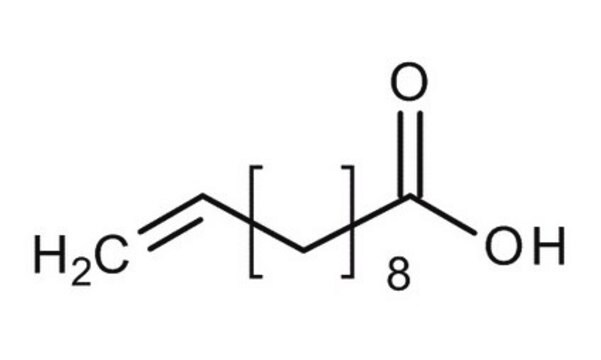W324721
Undecylenic acid
≥96%, FG
Synonym(s):
10-Undecenoic acid
About This Item
Halal
Kosher
Recommended Products
biological source
synthetic
Quality Level
grade
FG
Halal
Kosher
reg. compliance
EU Regulation 1334/2008 & 178/2002
Assay
≥96%
refractive index
n20/D 1.449 (lit.)
bp
137 °C/2 mmHg (lit.)
mp
23-25 °C (lit.)
density
0.912 g/mL at 25 °C (lit.)
application(s)
flavors and fragrances
Documentation
see Safety & Documentation for available documents
food allergen
no known allergens
Organoleptic
woody; sweet
SMILES string
OC(=O)CCCCCCCCC=C
InChI
1S/C11H20O2/c1-2-3-4-5-6-7-8-9-10-11(12)13/h2H,1,3-10H2,(H,12,13)
InChI key
FRPZMMHWLSIFAZ-UHFFFAOYSA-N
Looking for similar products? Visit Product Comparison Guide
General description
Application
- Emulsion Liquid Membranes Based on Os-NP/n-Decanol or n-Dodecanol Nanodispersions for p-Nitrophenol Reduction.: This study explores the use of emulsion liquid membranes incorporating undecylenic acid for the reduction of p-nitrophenol. The findings highlight the potential of these membranes in environmental applications, specifically in the removal of harmful organic compounds from water (Pîrțac et al., 2024).
- Retention behavior of nucleosides and nucleobases on a 3 μm undecylenic acid-functionalized silica column in per aqueous liquid chromatography and hydrophilic interaction liquid chromatography separation modes.: This article details the development of a novel undecylenic acid-functionalized silica column for improved separation of nucleosides and nucleobases. The column shows enhanced retention and selectivity, offering significant advancements in chromatographic techniques for biochemical analysis (Cheng et al., 2024).
Signal Word
Warning
Hazard Statements
Precautionary Statements
Hazard Classifications
Aquatic Chronic 3 - Eye Irrit. 2 - Skin Irrit. 2
Storage Class Code
11 - Combustible Solids
WGK
WGK 1
Flash Point(F)
300.2 °F - closed cup
Flash Point(C)
149 °C - closed cup
Regulatory Listings
Regulatory Listings are mainly provided for chemical products. Only limited information can be provided here for non-chemical products. No entry means none of the components are listed. It is the user’s obligation to ensure the safe and legal use of the product.
JAN Code
W324721-25KG-K:4548173920702
W324721-1KG-K:4548173920696
W324721-BULK-K:
W324721-10KG-K:4548173920689
W324721-SAMPLE-K:
W324721-VAR-K:
Choose from one of the most recent versions:
Already Own This Product?
Find documentation for the products that you have recently purchased in the Document Library.
Our team of scientists has experience in all areas of research including Life Science, Material Science, Chemical Synthesis, Chromatography, Analytical and many others.
Contact Technical Service







